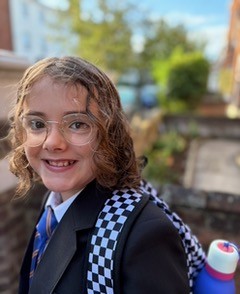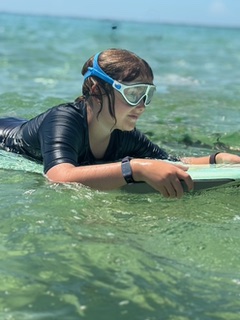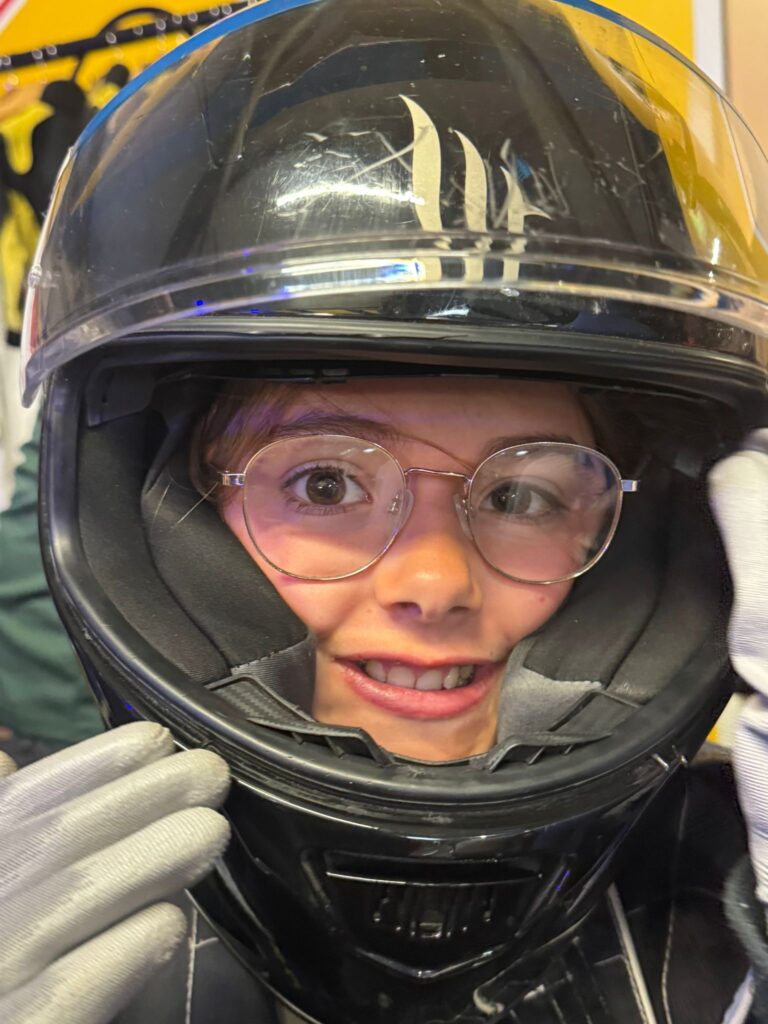A bit about us…

Today we sent Tessa off for her first day at secondary school. A rite of passage for any child and something that we have done before with two much older children. But for Tess things are different because just over two years ago she was diagnosed with a pituitary tumour (a craniopharyngioma). She missed months of school and had 2 major operations followed by proton beam therapy. She has since been left with panhypopituitarism, including AVP-D (diabetes insipidus) and difficulties with her vision.
As parents of a child who is still only two years into this journey, we are regularly learning new things and confronting new challenges. Tessa has fully replaced her hormones. She takes 12 separate pills a day and injects herself with growth hormone every night. She has also been started on oestrogen patches. Sometimes it can feel like every aspect of her development is monitored; she’s weighed, measured, examined and scanned more than any child would ever normally experience. Since being diagnosed, this year has been the first year that we have not had any major medical intervention. She has another MRI scan in September and we hope that her tumour continues to be under control.
Building an understanding of her condition
Our learning and understanding of Tessa’s condition has been led primarily by very supportive endocrine nurses and consultants. We have a close relationship with the paediatric team at our local hospital. Tessa’s consultant at our local hospital knows Tess personally. She has always been able to make space for Tessa and this has quite literally been a lifesaver but also psychologically it has been very helpful for us and for Tessa, as we can be reassured that the people who care for her understand her condition.
When Tessa has crises sometimes it’s obvious a result of an illness that we haven’t been able to quite manage with additional hydrocortisone. At other times it comes on very quickly. For Tess, this tends to start with gastric symptoms – tummy pain followed quite quickly by uncontrollable vomiting. When this happens we know there’s nothing else to do but get her to hospital. We know that it’s important to give her the emergency hydrocortisone injection that she needs but this is much easier said than done. She finds the experience extremely distressing so much so that we have only actually administered an injection once. The process of trying to mix the injection and loading it into a syringe whilst also dealing with a child who is becoming very unwell is a big ask for any parent and we hope that research will quickly lead to an easier delivery method. We understand that there might be an ‘epi-pen’ type syringe developed soon and I think this would be very helpful for parents managing children with this complex condition. I know it wouldn’t be any less painful but I’m sure it will be much easier to administer.
Learning to cope with the anxiety
In many ways, as parents, there feels like two levels of anxiety; the most acute of course being a concern around our child’s tumour regrowth and side-effects from invasive but life-saving treatments. Then there is the more everyday need to manage all the different medications and adjusting dosages to meet her needs.

Tessa has had a number of a crises which have left her in hospital, most recently and upsettingly the day before we were due to fly on a long-haul flight to Miami. Our trip had to be delayed four days until she was well enough. Perhaps this illustrates some of the unpredictability of her condition but also her resilience and the incredible support of NHS staff both in our local hospital but also at Addenbrookes.
Despite the medical difficulties, the hospital trips, the anxiety, considerable periods of ill-health and the loss of time in education, Tessa still lives an exceptionally full life. She travelled to Miami and to Mexico City this summer, she has been on many camping trips, and gone on two adventure holidays with her school. She has climbed ladders, swung on ropes, driven go-karts at alarmingly fast speeds and she loves her youth theatre club. She has a good group of friends and now she is excited about starting this new chapter in her life at secondary school.

It is tricky navigating the education system when you have a ridiculously rare and complex medical condition, but our 11-year-old daughter is confident and excited about what lies ahead.
Some of the things we’ve learnt
Trust your gut, and your child
Hypopituitarism affects children in very different ways. The condition is often caused by pituitary tumours and the impact of that tumour affects children differently. There is no standard presentation which means that parents have to become very tuned in to what is normal for their child. Trusting your gut and giving your child as much control as you can has been very important for us. Our child needs to learn not to dismiss the subtle signs of impending illness.
Beware of too much doom scrolling
Forums can be full of the worst-case scenarios. Very little time online is given over to the minor victories and the everyday hacks.
Prepare to do some learning!
You have to almost become an endocrinologist in order to understand the scientific research and to explain your child’s condition to other people (including medical people!). We have a crib sheet for school and clubs that Tessa attends.
Help them to take control of their health
As Tess has come to understand her condition and as she has grown older and more independent, we have given her increasing levels of control over her medication. We work hard to not get cross or too anxious if she forgets to take them. We don’t want to be in a position where she decides not to tell us or somebody else that she’s made a mistake for fear of being told off.
We have encouraged Tessa to be as independent as possible, to a level that perhaps shocks some professionals! She carries her own medication at school and she is becoming involved in ordering medication from the pharmacy and measuring out her daily pills in their pillboxes every week. We truly believe that the more this can become part of her everyday life, then the easier it will be for her to manage things as she gets older.
Understand the effects of medication
High doses of hydrocortisone bring out the dark side of Tessa. This can be scary for us to witness. Every time she is given emergency doses, she comes out of hospital in a state of almost acute anger and depression. We know that this passes but it’s quite hard for us to experience.
Be prepared
We have a pre-packed hospital bag – 2 pairs of knickers, pyjamas, eye-masks, basic toiletries and a spare phone/ipad charger. In there we have an up-to-date list of Tessa’s medication and her steroid emergency information card. We hope the bag gathers dust but it’s handy to have and beats scrabbling around for things in a state of panic.
We’ve really got used to peeing in the wild! It’s not always easy to find a toilet and Tess refuses to let me use the ‘Please allow me access to a loo’ card on her behalf. We have a Kiddi Whizz (adult size) which glows in the dark which enables women and girls to pee standing up – and which has been incredibly useful when we’re camping or just generally out and about!
Keep schools informed
We have been very vocal and robust in our responses to education. Tessa was extremely well supported in her primary school but we have had to be very clear with education systems in order to make sure that she has the support that she needs, both medically and for her education. We are hoping to hear soon that she will receive an Education Health Care Plan based on her complex medical needs. Tessa loves learning but her attendance in the past two years has been around 75%. She needs to be able to achieve at a level that she is capable of despite her medical condition and this has to be recognised through a formal process.
Tess recorded a two-minute video which was circulated to teachers at her secondary school. It consists of her explaining who she is and a bit about her condition. This is an idea that came from a friend of ours who is a teacher. It gives much more information much quicker than reading about Tess from a medical care plan.
Find routines that work
Tessa needs to eat at regular intervals to keep her energy levels up. We keep a close eye on her diet trying to balance her energy needs with sensible and healthy eating. Her diet is relatively healthy but we know that when she gets hungry it can lead to a crisis.
We have developed routines which include Tessa having quite a lot of downtime and rest. But we also encourage Tessa to try everything!
Advocate for, and with, your child and make use of the help available
We encourage Tessa to advocate for herself and she has developed a narrative about her condition that she can share with others if she needs to. Tessa wears a medical alert bracelet at all times and she has an i-watch which reminds her to take her medication. She carries additional pills in her keyring.
We have been confident in advocating for Tessa’s medical issues when we need to. For example, when we flew long haul we requested medical assistance which meant that we were given better seats. We were given food quickly and Tess could access the toilets easily. This made the whole experience more straightforward. When Tess did become slightly unwell on the flight home, she received speedy and helpful support from the staff on the airplane and at the airport.
Tessa now has an Access Card. As a result, with affiliated companies she gets reduced price seats for cinemas and theatres and museums etc. She has been able to see top London shows cheaply and has been given seats with easy access to toilets and where she can see the stage easily. These seats are normally extremely expensive, so we have all benefitted!
Sometimes we feel like we’re gaming the system and then we have to remind ourselves that Tessa and other children in her position do carry the burden of their hidden disability every day and have to adapt to it all the time. When help is available and support can be given, then it is important to take it.
We have used the resources of The Pituitary Foundation who have always been helpful. We remember particularly the webinar where a young person talked us through her life at school in such an encouraging and empowering way. Many of the tips that she gave us during that talk we have tried to replicate as Tess begins secondary school.
Tessa and other children in her position do carry the burden of their hidden disability every day and have to adapt to it all the time. When help is available and support can be given, then it is important to take it.
What is clear is that there isn’t much information or space to discuss life for parents and children of Tessa’s age and younger. I have been able to network with two other parents who I met through attending proton beam therapy. Our children now talk online to each other. I know Tessa would love to find another girl of her own age who she could share her experiences with, but such connections are hard to find. We hope to find new ways in the future, to meet others like Tessa.







